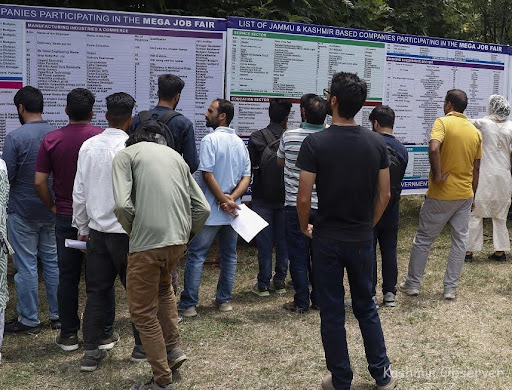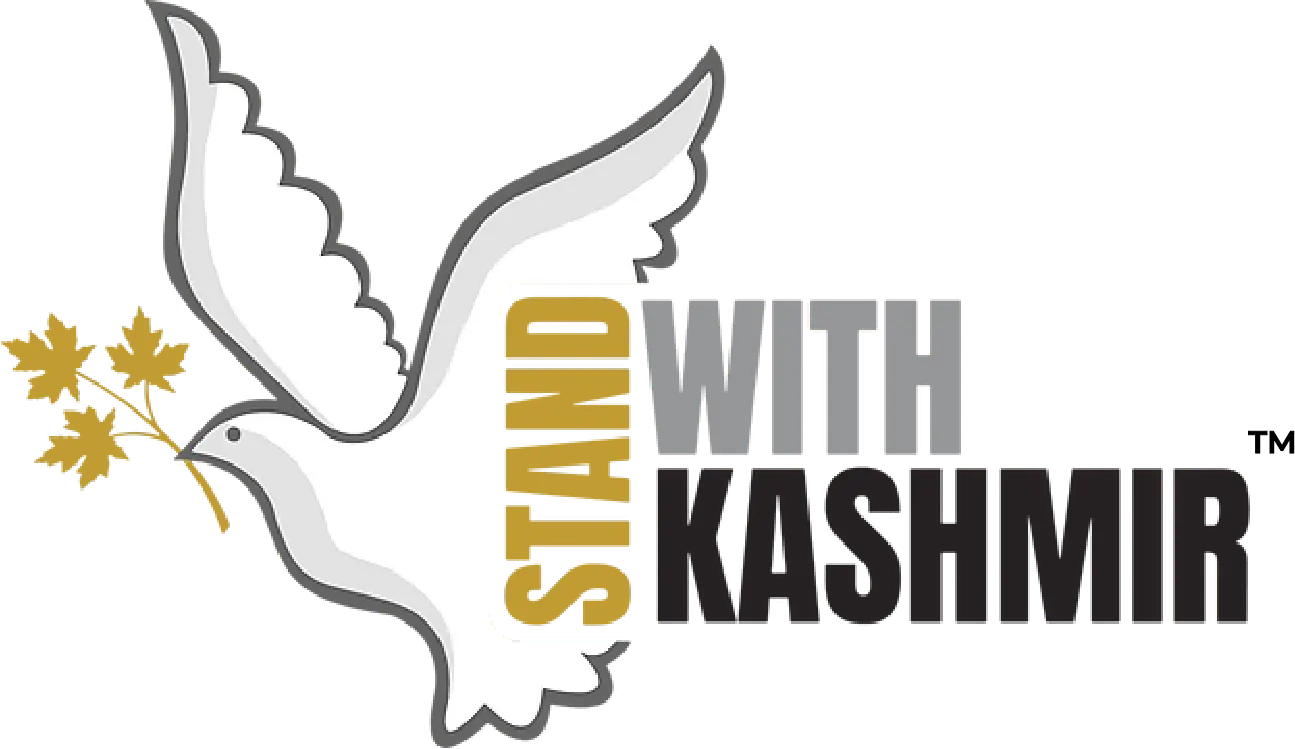August 17, 2024

India’s Home Minister wants political ‘vetting’ of Kashmiris aspiring for government jobs after several Kashmiris were terminated from their jobs due to political vendetta. This new move will impact over 50,000 families pushing more youngsters into joblessness.
India’s Home Minister, Amit Shah, has announced a new policy whereby anyone with “links to rebels or protesters” will not be eligible for a government job, a primary source of employment for Kashmiris, employing 450,000 people. Due to massive militarisation of everyday life, frequent internet suspensions and state enforced curfews in the past seven decades, the private sector in the region was never allowed to develop into a significant job provider. In a region where all aspects of life are regulated and dictated by the occupation, this is no coincidence. It is an attempt by the Indian state to keep Kashmiris dependent on the government for employment.
Kashmir’s current unemployment rate is the highest in its history, reaching 34.80 percent according to the International Labour Organisation’s 2024 report. With government jobs scarce, the unemployment rate is expected to rise due to India’s continued stranglehold on the local economy.
Local businesses have been struggling since August 2019, after India annexed the Kashmir region by abrogating its autonomy. According to local estimates, the economy lost over $5.3 billion, resulting in at least 100,000 job cuts—a significant number for a population of 12.5 million people.
To understand the fragility of the economy, we must examine its key sectors and how it has been affected by the occupation:
The region’s economy comprises four major sectors: agriculture, tourism, handicrafts, and power.
1. Agriculture:
Agriculture is the primary economic sector of Kashmir, with over 70 percent of the population depending on it. The horticulture sector has an annual turnover of $1.3 billion, employing at least 3.5 million people. Additionally, saffron farming supports over 30,000 families.
However, militarization, political instability, and the climate crisis are severely affecting this sector. For example, saffron production has decreased by 65 percent in two decades. India, the primary market, has also invited overseas competition, further impacting businesses. This increases farming and production costs, reducing revenues and the capital available to employ more people.
Export of apples and other fruits has always been the backbone of the region’s economy, and this has been targeted by the Indian state. This entails incentivising the cultivation of non-local apple trees which locals lack the know-how of, making them depend on state agencies for directions and guidance. This was further complemented with stranding fruit laden trucks on the Jammu-Srinagar highway for days on end, leading to the fruit going bad and fetching the minimum possible price in indian markets, which are the only permissible export markets. Along with this, the indian state has also been allowing a heavy influx of Iranian apples, which drives down the demand for Kashmiri apples and in turn the rates.
The Indian military has occupied thousands of acres of land across the region. But increasing state projects, such as railways, have also affected farmland, often forcibly acquired by the state for military projects, causing heavy losses to farmers.
2. Tourism:
Tourism is a politicized economic sector contributing only 8 percent to the region’s GDP. This sector employs over 100,000 people. However, frequent political instability, militarization, and state violence create vulnerabilities, resulting in recurring cycles of job losses.
3. Handicrafts:
Over 350,000 people, mostly from socially underprivileged classes and below the poverty line, are involved in this industry. The highest turnover of the handicrafts industry was estimated at $250 million in 2013, but due to political instability, economic downturn, and militarization, revenue dipped to $34 million in 2019 after India’s abrogation of the region’s nominal autonomy, causing massive job losses.
4. Power Sector:
The region has a potential of 20,000 MW but is under the exploitative control of the Indian state-owned National Hydroelectric Power Corporation (NHPC), often referred to as the “East India Company of Kashmir.” From 2001 to 2018, NHPC earned approximately $2.4 billion in revenue from seven hydroelectric projects across the region, paying only $404.27 million as royalty through electrical supplies. This electricity benefits India; Kashmir often faces frequent power shutdowns and higher electricity costs.
With a lack of industrial avenues and private industries due to military occupation, Kashmiris often have no choice but to apply for government jobs. Among the highest employers in the region is the Jammu and Kashmir police, with an estimated workforce of over 128,000 personnel, making it the 20th largest armed force in the world (among countries).
Another option is the brain drain, which forces young Kashmiris outside of Kashmir for jobs, including in India where they face discrimination. At least 60,000 families in Kashmir are on the passport blacklist, further reducing their opportunities. With the new announcement of “deep-vetting,” India is using collective punishment to push Kashmiris to the wall or into exile.
How is the government using employment to criminalize dissent?
1. Firing Kashmiris from Government Jobs
In recent years, the indian state has increasingly fired Kashmiris from government jobs for dissenting or criticizing its policies. Circulars regulate the social media activities of all government employees, leading to the dismissal of hundreds for non-compliance. Many long-serving employees, including those in teaching and health services, have lost their jobs and pensions. Following the abrogation of Article 370, a new law allows the government to dismiss any employee deemed a “threat to national security,” effectively criminalizing dissent.
Junaid Ahmed (name changed) shared his uncle’s story: a teacher who worked on an ad-hoc basis for seven years (was paid a salary of $25 – $35 per month during that time) before being regularized a decade ago. He was recently dismissed under the new law, losing his pension and benefits. Now, he struggles to support his family through private tuitions, which are also threatened by the rise of Indian edtech startups. Junaid’s uncle was dismissed for attending a 2016 demonstration demanding the return of Maqbool Bhat and Afzal Guru’s remains.
Dismissals also extend to relatives of those involved in Kashmir’s freedom struggle, impacting livelihoods and leading to property seizures and home demolitions. Aashiq Ahmad Sheikh (name changed), dismissed from the Jammu and Kashmir Police Service last year, suffered due to his brother’s alleged involvement with a rebel group. His brother disappeared in over 15 years go, and years later, a photo showed him among rebels killed in what Aashiq suspects was a staged encounter. Aashiq believes that he and his family’s insistence of this being a fake encounter was the real reason for his dismissal.

2. Denying Police Verification:
In recent years, hundreds of Kashmiri youth who passed the State Public Service Commission and Service Selection Board exams for government jobs have faced extensive background checks by Indian police and intelligence. The pervasive freedom sentiment in Kashmir often leads to links being found between these youth and the freedom movement, resulting in job denial.
Ghulam Nabi (name changed) shared his story: his youngest uncle went missing in 1990, rumored to have joined rebels and later tortured to death. Despite no contact with his uncle, Ghulam’s verification for a government job was denied due to this connection. “What have I done? I have a family of three to provide for,” he says.
Ishfaq Ahmad (name changed) faced a similar fate. Despite moving out of his parents house five years ago, his verification was denied due to his father’s minor past affiliation with Jamaat e Islami, a group banned in 2019. Ishfaq laments, “An officer even suggested that if my father were dead, my verification might have been approved. What sort of world do we live in?”
Sources:
Das, A. (2023, December 13). J&K after Article 370: Economy and politics of Union Territory since 2019. The Indian Express. https://indianexpress.com/article/political-pulse/jk-after-article-370-economy-and-politics-of-union-territory-since-2019-9065855/
Gupta, S. (2023, December 4). Survey: Himachal Pradesh, Rajasthan see highest youth unemployment rate in July-September. The Times of India. https://timesofindia.indiatimes.com/india/survey-himachal-pradesh-rajasthan-see-highest-youth-unemployment-rate-in-july-september/articleshow/105713863.cms
Hussain, A. (2024, April 3). Apple village up in arms against new railway line in Shopian. Hindustan Times. https://www.hindustantimes.com/cities/chandigarh-news/apple-village-up-in-arms-against-new-railway-line-in-shopian-101712083605897.html
Jammu & Kashmir – India | Data and statistics – Knoema.com. (n.d.). Knoema. https://knoema.com/atlas/India/Jammu-and-Kashmir#Economy
Migrator. (2018, March 2). THE ROAD TO EXPLOITATION. Greater Kashmir. https://www.greaterkashmir.com/opinion/the-road-to-exploitation/
Salam, A. (2024, April 23). Downtown residents stage protest against inflated electricity bills. Greater Kashmir. https://www.greaterkashmir.com/city/downtown-residents-stage-protest-against-inflated-electricity-bills/
Yousuf, D. (2021, September 21). Kashmir’s Economy: A Contemporary Overview. Centre for Land War Studies. https://www.claws.in/kashmirs-economy-a-contemporary-overview/
Stay in touch with Stand with Kashmir.
Stand With Kashmir (SWK) is a Kashmiri-driven independent, transnational, grassroots movement committed to standing in solidarity with the people of indian-occupied Kashmir in ending the indian occupation of their homeland and supporting the right to self-determination of the pre-partition state of Jammu and Kashmir. We want to hear from you. If you have general inquiries, suggestions, or concerns, please email us at info@standwithkashmir.org.


Leave a Reply